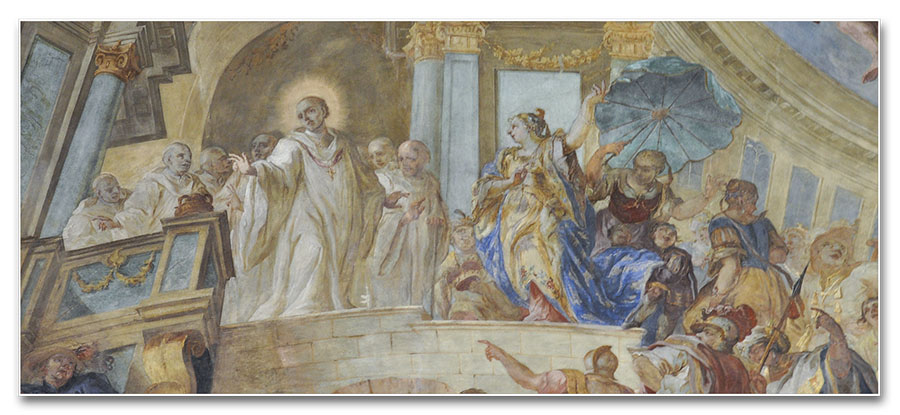Saturday of the 5th Week in Ordinary Time
Mass Readings
First Reading – 1 Kgs 12:26-32; 13:33-34
Jeroboam thought to himself: “The kingdom will return to David’s house. If now this people go up to offer sacrifices in the temple of the LORD in Jerusalem, the hearts of this people will return to their master, Rehoboam, king of Judah, and they will kill me.” After taking counsel, the king made two calves of gold and said to the people: “You have been going up to Jerusalem long enough. Here is your God, O Israel, who brought you up from the land of Egypt.” And he put one in Bethel, the other in Dan. This led to sin, because the people frequented those calves in Bethel and in Dan. He also built temples on the high places and made priests from among the people who were not Levites. Jeroboam established a feast in the eighth month on the fifteenth day of the month to duplicate in Bethel the pilgrimage feast of Judah, with sacrifices to the calves he had made; and he stationed in Bethel priests of the high places he had built. Jeroboam did not give up his evil ways after this, but again made priests for the high places from among the common people. Whoever desired it was consecrated and became a priest of the high places. This was a sin on the part of the house of Jeroboam for which it was to be cut off and destroyed from the earth.
Responsorial Psalm – 106:6-7ab, 19-20, 21-22 (R.4a)
R. Remember us, O Lord, as you favor your people.
We have sinned, we and our fathers;
we have committed crimes; we have done wrong.
Our fathers in Egypt
considered not your wonders. R.
They made a calf in Horeb
and adored a molten image;
They exchanged their glory
for the image of a grass-eating bullock. R.
They forgot the God who had saved them,
who had done great deeds in Egypt,
Wondrous deeds in the land of Ham,
terrible things at the Red Sea. R.
Gospel – Mk 8:1-10
In those days when there again was a great crowd without anything to eat, Jesus summoned the disciples and said, “My heart is moved with pity for the crowd, because they have been with me now for three days and have nothing to eat. If I send them away hungry to their homes, they will collapse on the way, and some of them have come a great distance.” His disciples answered him, “Where can anyone get enough bread to satisfy them here in this deserted place?” Still he asked them, “How many loaves do you have?” They replied, “Seven.” He ordered the crowd to sit down on the ground. Then, taking the seven loaves he gave thanks, broke them, and gave them to his disciples to distribute, and they distributed them to the crowd. They also had a few fish. He said the blessing over them and ordered them distributed also. They ate and were satisfied. They picked up the fragments left over–seven baskets. There were about four thousand people. He dismissed the crowd and got into the boat with his disciples and came to the region of Dalmanutha.
Featured Saints
Blessed Humbeline of Jully, prioress (†1136). Convinced to abandon the pleasures of the world by her brother, St. Bernard of Clairvaux, she entered the monastery of Jully-les-Nonnains, near Troyes, France as a simple nun, with her husband’s permission. She later became prioress of the community.
St. Meletius, bishop (†381). He was exiled several times for defending the precepts from the Council of Nicaea. He died while presiding over the First Ecumenical Council of Constantinople. His holiness merited the praise of St. John Chrysostom and St. Gregory of Nyssa.
St. Anthony Kauleas, bishop (†901). Patriarch of Constantinople, he worked to consolidate peace and unity in the Church, unsettled by the Photian schism.
St. Benedict of Aniane, abbot (†821). Educated in the court of Pepin the Short, he became a monk under the Benedictine rule and promoted the restoration of monastic observance throughout France and Germany
St. Saturninus and companions, martyrs. Known as the Martyrs of Abitinae, a town in Northern Africa, under Roman rule. They were imprisoned, tortured and killed in 304 during the persecution of Diocletian.
St. Ludan, pilgrim (†1202). Native of Scotland, the son of Prince Hildebold, he cared for the sick and built hospitals and orphanages. He died in Northeim, Germany, while on pilgrimage to the Basilicas of the Apostles.
Blesseds Thomas Hemerford, James Fenn, John Nutter, John Munden and George Haydock, priests and martyrs (†1584). Disemboweled alive at Tyburn, London, during the reign of Elizabeth I.







